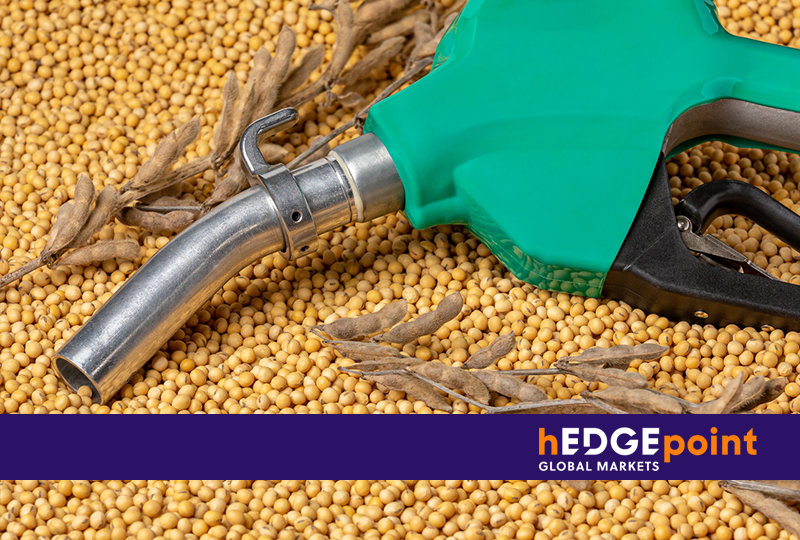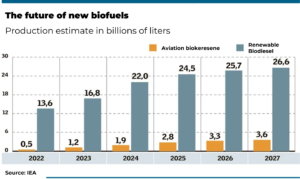
On August 10th, we celebrate International Biodiesel Day, a tribute to this renewable energy source that raises awareness about the importance of non-fossi

On August 10th, we celebrate International Biodiesel Day, a tribute to this renewable energy source that raises awareness about the importance of non-fossil fuels.
Growing concerns about social, economic, and environmental issues have led to a trend in the commodities market, making biodiesel an alternative to diversify the energy market. In countries like the United States and Brazil, its production gains strength each year, increasing the share of this commodity that complements the energy matrix.
In this text, we explain everything you need to know about biodiesel!
Biodiesel is a fuel made from vegetable oil or animal fat, making it biodegradable and renewable. As a result, it is considered a clean and organic energy commodity.
Its production can be carried out with methanol (usually synthesized from wood biomass), resulting in methyl ester, or with ethanol, in the form of ethyl ester (from sugarcane). In both processes, glycerin is produced as a byproduct, which can enhance the competitiveness of biodiesel, as this substance is a raw material in the production of paints, adhesives, pharmaceuticals, etc.
The raw materials for vegetable oil production (used in biodiesel) are varied. Among them, we can highlight sunflower oil, soybean oil, palm oil, cotton, corn, and other crops that vary according to agricultural aptitude and the specific climate of each region. In the case of animal fat, it can come from bovine, swine, and poultry tallow.

Austin Hagerty, Head of Desk Sales – Energy US/LATAM
“The biodiesel industry is exposed to price volatility across several commodity markets given its inherent exposure to both Energy and Agricultural markets. Given the ever-changing landscape of this market, finding a risk manager who understands the fundamentals affecting the grains, oilseeds, and energy markets is crucial to formulating a proper comprehensive risk management strategy,” Austin Hagerty, Head of Desk Sales – Energy US/LATAM
The history of biodiesel began in 1895 when Rudolf Diesel and Henry Ford discovered vegetable oils as a fuel to drive industrial development. They researched various fuels that could be used in engines, such as alcohol produced from biomass.
This initiative was the starting point for vegetable oil to be associated with alcohol. Thus, a chemical process called transesterification was originated, characterized by the separation of glycerin from vegetable oil. The result? The creation of a new renewable fuel, vegetable oil ester, known as biodiesel.
The use of biodiesel is an alternative to diversify a nation’s energy matrix. In this way, it reduces the exclusive dependence on petroleum as a fuel source.
Countries can, therefore, become less vulnerable to variations in oil prices and supply chain disruptions. Additionally, biodiesel production is linked to specific oilseed crops, such as soybeans or palm, significantly boosting this market.
Biodiesel can also be produced from animal fats and cooking oils used, reducing the amount of waste that would be improperly discarded. The development of biodiesel thus contributes to boosting agriculture and the economy, generating employment opportunities.
In 2022, the main biodiesel-producing countries, according to the International Renewable Energy Agency (IRENA), were:
According to the International Energy Agency (IEA) report, Brazil, India, and Indonesia are expected to lead the world’s biofuel demand growth between 2023 and 2024. These nations have ample availability of raw materials to expand production and are investing in biodiesel development to offset part of petroleum derivative imports.
Renewable diesel is often confused with biodiesel, as they are both clean fuels but with distinct chemical properties. Known as green diesel, it can be produced in different ways, such as:
Its composition is like petroleum-derived diesel. Therefore, it can be blended with mineral diesel in any proportion, even in full replacement. Hydrotreated Vegetable Oil (HVO) is one of the main types of renewable diesel.
It results from the hydrogenation of vegetable oils, animal fats, microorganisms, and waste, such as used cooking oil. HVO is the third most used biofuel in the world. Among its benefits, we can mention:
In the chart, you can see the estimated production of renewable diesel.

Source: International Energy Agency
The biodiesel market is subject to various factors and can be highly volatile. One of its main fluctuations is in the prices of agricultural commodities, which directly affect biodiesel production costs and can be influenced by climate and local and global economies.
Additionally, demand can change due to new government policies, causing price fluctuations. In this scenario, risk management becomes crucial for your business.
hEDGEpoint has experts across the globe in agricultural and energy markets with an ever-changing focus on combining these skillsets and addressing the needs of customers with exposure to both sides of the biofuels markets.
We combine market intelligence with risk management tools, offering data and insights.
Contact a hEDGEpoint professional to learn more.

Rua Funchal, 418, 18º andar - Vila Olímpia São Paulo, SP, Brasil
Contato
(00) 99999-8888 example@mail.com
Section
Home
O que Fazemos
Mercado
Quem Somos
HUB
Blog
Esta página foi preparada pela Hedgepoint Schweiz AG e suas afiliadas (“Hedgepoint”) exclusivamente para fins informativos e instrutivos, sem o objetivo de estabelecer obrigações ou compromissos com terceiros, nem de promover uma oferta ou solicitação de oferta de venda ou compra de quaisquer valores mobiliários, commodity interests ou produtos de investimento.
A Hedgepoint e suas associadas renunciam expressamente a qualquer uso das informações contidas neste documento que direta ou indiretamente resulte em danos ou prejuízos de qualquer natureza. As informações são obtidas de fontes que acreditamos serem confiáveis, mas não garantimos a atualidade ou precisão dessas informações.
O trading de commodity interests, como futuros, opções e swaps, envolve um risco substancial de perda e pode não ser adequado para todos os investidores. Você deve considerar cuidadosamente se esse tipo de negociação é adequado para você, levando em conta sua situação financeira. O desempenho passado não é necessariamente indicativo de resultados futuros. Os clientes devem confiar em seu próprio julgamento independente e/ou consultores antes de realizar qualquer transação.
A Hedgepoint não fornece consultoria jurídica, tributária ou contábil, sendo de sua responsabilidade buscar essas orientações separadamente.
A Hedgepoint Schweiz AG está organizada, constituída e existente sob as leis da Suíça, é afiliada à ARIF, a Associação Romande des Intermédiaires Financiers, que é uma Organização de Autorregulação autorizada pela FINMA. A Hedgepoint Commodities LLC está organizada, constituída e existente sob as leis dos Estados Unidos, sendo autorizada e regulada pela Commodity Futures Trading Commission (CFTC) e é membro da National Futures Association (NFA), atuando como Introducing Broker e Commodity Trading Advisor. A Hedgepoint Global Markets Limited é regulada pela Dubai Financial Services Authority. O conteúdo é direcionado a Clientes Profissionais e não a Clientes de Varejo. A Hedgepoint Global Markets PTE. Ltd está organizada, constituída e existente sob as leis de Singapura, isenta de obter uma licença de serviços financeiros conforme o Segundo Anexo do Securities and Futures (Licensing and Conduct of Business) Act, pela Monetary Authority of Singapore (MAS). A Hedgepoint Global Markets DTVM Ltda. é autorizada e regulada no Brasil pelo Banco Central do Brasil (BCB) e pela Comissão de Valores Mobiliários (CVM). A Hedgepoint Serviços Ltda. está organizada, constituída e existente sob as leis do Brasil. A Hedgepoint Global Markets S.A. está organizada, constituída e existente sob as leis do Uruguai.
Em caso de dúvidas não resolvidas no primeiro contato com o atendimento ao cliente (client.services@hedgepointglobal.com), entre em contato com o canal de ouvidoria interna (ombudsman@hedgepointglobal.com – global ou ouvidoria@hedgepointglobal.com – apenas Brasil) ou ligue para 0800-8788408 (apenas Brasil).
Integridade, ética e transparência são valores que guiam nossa cultura. Para fortalecer ainda mais nossas práticas, a Hedgepoint possui um canal de denúncias para colaboradores e terceiros via e-mail ethicline@hedgepointglobal.com ou pelo formulário Ethic Line – Hedgepoint Global Markets.
Nota de segurança: Todos os contatos com clientes e parceiros são realizados exclusivamente por meio do nosso domínio @hedgepointglobal.com. Não aceite informações, boletos, extratos ou solicitações de outros domínios e preste atenção especial a variações em letras ou grafias, pois podem indicar uma situação fraudulenta.
“Hedgepoint” e o logotipo “Hedgepoint” são marcas de uso exclusivo da Hedgepoint e/ou de suas afiliadas. O uso ou reprodução é proibido, a menos que expressamente autorizado pela HedgePoint.
Além disso, o uso de outras marcas neste documento foi autorizado apenas para fins de identificação. Isso, portanto, não implica quaisquer direitos da HedgePoint sobre essas marcas ou implica endosso, associação ou aprovação pelos proprietários dessas marcas com a Hedgepoint ou suas afiliadas.
aA Hedgepoint Global Markets é correspondente cambial do Ebury Banco de Câmbio, de acordo com a resolução CMN Nº 4.935, DE 29 DE JULHO DE 2021, Artigo 14 do Banco Central do Brasil (BACEN).
Para mais informações sobre nosso parceiro, serviços disponíveis, atendimento e ouvidoria, acesse o link a seguir: https://br.ebury.com/